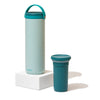When my son was born, my goal was to breastfeed for a year. I knew that was the recommendation (I’m a rule follower) and took very seriously doing anything and everything I could to be a “good” new mom to my brand new baby. It went okay at the beginning—aside from the usual learning curve, painful nipples, endless worries about whether I actually had thrush, whether the broccoli I just ate was giving him gas pain—the list is, as all new moms know, interminable. But around five months, my son stopped gaining weight. I was brushed off by our pediatrician (“He’s fine.”) and relentless Google searching (“Five months why isn’t baby gaining weight?”) didn’t help. Finally, a sleep consultant suggested that I check my milk supply and introduce a bottle of formula before bed.
It was like magic. My grumpy baby started sleeping better and was back on track for his growth curve... And me? I felt so guilty. Like I was a complete failure. I made it to seven months by combination feeding my baby breastmilk and formula and pumping as much as I could. But in the end, I just couldn’t keep up - almost five months short of my goal.
With my daughter, I had more experience, and by that time I worked at Willow so I was equipped with a life-changing pump, more confidence, and a lot more knowledge about how to approach my breastfeeding goals and that it was ok to “fail.” I set out to make it to a year, again, and ultimately got to nine months. This time, I felt proud of what I’d done—through a pandemic, no less—and confident when I stopped that it was best for my mental health, and by extension, best for my baby, too.
I had so many advantages as I embarked on my breastfeeding journeys. I was fortunate to have more than four months of paid family leave so that I could start my journey with on-demand feeding and manage the round-the-clock sleepless feedings that a newborn requires. I had access to and knowledge of technology like Willow to help make pumping easier while I managed childcare and work. I had good medical coverage and care. And I still “failed” to meet the goal that I believed I had to meet and had to navigate combination feeding without clear resources because breastfeeding education was always geared back to “breast is best.”
It’s with the lens of my personal experience that I read the latest AAP guidelines recommending that moms breastfeed for two years. Sounds great … I guess? But here in the United States, 80% of new mothers already initiate breastfeeding. They already know that breastfeeding is a great thing to do. But, 60% report that they don’t breastfeed as long as they want to, and only 35% make it to one year. Why? Because we are in the United States where Paid Family Leave legislation sits and collects dust somewhere in Washington D.C., the PUMP Act is voted down in Congress, all while there’s a nationwide formula shortage during a pandemic that has left parents with historically low levels of support and childcare. We can recommend guidelines and advocate for breastfeeding until we are blue in the face, but frankly, none of these recommendations are achievable or realistic without real systemic change.
The problem isn’t that moms don’t want to breastfeed, it’s that they are set up to fail, and then set up to feel bad about themselves when they do.
Willow is in the business of breastfeeding but, more importantly, we are in the business of supporting moms. While we are in full support of raising awareness around medically-backed health benefits and the emotional importance of breastfeeding to both mom and baby, awareness isn’t enough. Breastfeeding Awareness Month exists to protect and promote breastfeeding, but I’m wishing for a future when breastfeeding advocates also come together to promote societal change that supports new parents.
At Willow, we've joined PL+US and Chamber of Mothers to help advocate for social change. We appreciate that the AAP referenced the need for more support for new parents in their recommendations but that means we need everyone—that’s pediatricians, lactation consultants, and public health advocates—to join together to advocate for that change. Can we answer the call?

















